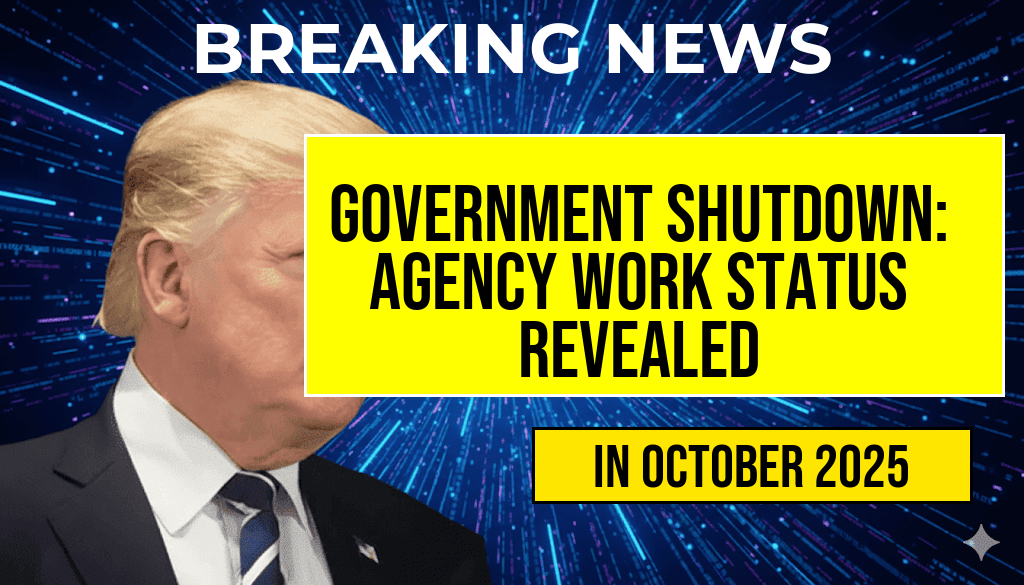The prospect of a federal government shutdown has become a pressing concern as Congress grapples with budgetary disagreements. As lawmakers debate the fiscal path forward, millions of Americans are left wondering about the implications for various government services. A comprehensive agency breakdown sheds light on which departments will continue to operate and which will face disruptions. Key agencies such as the Social Security Administration, the Internal Revenue Service (IRS), the Department of Defense, and the Transportation Security Administration (TSA) will see varied impacts. This article provides essential insights into the operational status of these agencies and what citizens can expect during a potential shutdown.
Federal Agencies: Operational Status During Shutdown
Understanding which federal agencies remain operational during a shutdown is crucial for planning. During a government shutdown, many federal employees are furloughed, while others are deemed essential and continue to work without immediate pay. Here’s a breakdown of the major agencies and what citizens can expect:
Essential Services Remain Operational
- Social Security Administration (SSA): Payments for social security benefits will continue, although new claims may face delays. Current beneficiaries will still receive their payments on schedule.
- Department of Defense (DoD): The military will remain operational, with active-duty personnel continuing their duties. However, many civilian employees may be furloughed.
- Transportation Security Administration (TSA): Security operations at airports will continue, ensuring that travelers can pass through security checkpoints without major disruptions.
- Veterans Affairs (VA): VA health care services will remain available, ensuring veterans continue to receive necessary medical treatment.
Agencies Facing Significant Disruptions
- Internal Revenue Service (IRS): While tax refunds will not be processed, essential functions such as taxpayer assistance may operate at reduced capacity.
- Environmental Protection Agency (EPA): Many EPA functions will be halted, including permitting and monitoring activities, as non-essential staff will be furloughed.
- U.S. Department of Education: Most programs will face delays, including disbursement of federal student loans and grants.
Implications for Federal Employees
During a government shutdown, many federal employees are impacted directly. Essential employees continue to work but may not receive paychecks until the budget crisis is resolved. Furloughed employees, on the other hand, are sent home without pay. According to recent reports, approximately 800,000 federal workers could be affected, leading to economic uncertainty for many families.
Economic Impact of a Shutdown
The economic ramifications of a government shutdown extend beyond federal employees. Local businesses, especially those reliant on government contracts, may experience significant financial strain. The longer the shutdown persists, the greater the ripple effects felt throughout the economy. According to estimates by the Brookings Institution, each week of a shutdown could cost the economy billions in lost productivity.
Public Services and Safety
Public safety services, such as law enforcement and emergency response, will continue to operate during a shutdown. Federal law enforcement agencies, including the FBI and the U.S. Marshals, will still function, although some administrative functions may be curtailed. This ensures that the basic framework for national security remains intact.
Transportation and Travel
| Agency | Operational Status |
|---|---|
| TSA | Operational |
| Federal Aviation Administration (FAA) | Operational |
| Amtrak | Operational |
| Public Transit | Operational |
Looking Ahead
The potential for a government shutdown prompts significant concern among citizens regarding the continuity of essential services. As Congress continues to negotiate funding solutions, it is critical for Americans to stay informed about the operational status of federal agencies that impact their daily lives. Resources such as the Congress.gov website provide regular updates and information regarding legislative actions, ensuring that the public remains aware of developments that could affect their access to government services.
The outcome of budget negotiations will determine the timeline and extent of any government shutdown, making it essential for citizens to monitor the situation closely. Understanding which agencies are operational can help mitigate the impacts of a shutdown on everyday life.
Frequently Asked Questions
What happens to Social Security payments during a government shutdown?
During a government shutdown, Social Security payments continue to be processed. The Social Security Administration is considered an essential service, so beneficiaries will receive their payments without interruption.
Is the IRS operational during a government shutdown?
During a government shutdown, the IRS may have limited operations. While some essential functions, such as processing tax refunds, might continue, many services, including taxpayer assistance, are suspended.
How does a government shutdown affect defense operations?
Defense operations generally continue during a government shutdown, as the Department of Defense is exempt from such disruptions. Military personnel and essential support staff typically remain on duty.
Will the TSA continue to operate during a government shutdown?
Yes, the TSA remains operational during a government shutdown. Airport security and screening processes are considered essential services and will continue to function to ensure public safety.
What should federal employees expect during a government shutdown?
During a government shutdown, federal employees may face furloughs or be required to work without pay, depending on their agency and whether they are classified as essential or non-essential staff.

Leave a Reply